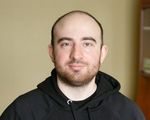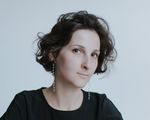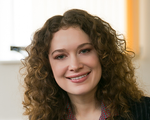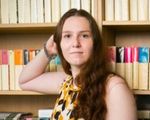About Success Builder
How do you find your place in life? How do you find something to do that both comes naturally to you and makes you happy? The answer is that you have to apply the knowledge you’ve gained from university and from life itself correctly. The Success Builder Project features HSE University graduates who have discovered themselves through an interesting business or an unexpected profession. The protagonists share their experiences and lessons learnt and talk about how they’ve made the most of the opportunities they were given.
Alexandra Gudimova, graduate of the WEaIA Faculty, decided to study at HSE University because of an injury. She had to leave choreography academy, forget about ballet and the Bolshoi Theater, and restart her life from scratch. Now she heads a thriving business whose success attests to her professionalism. In this instalment of Success Builder, Ms Gudimova talks about how to write a graduate thesis about a family business, ride the snacking wave and create fast food for city dwellers.
Many girls dream in childhood of becoming ballerinas, but few succeed. How did you manage to get into the Bolshoi Ballet Academy?
I was born in Moscow and lived in Gagarin Square. One of Russia’s most famous choreography schools was located at the nearby Frunze Embankment and open to children 10 years and older. Before that, I studied first in an ordinary school, then in a private school that offered dance lessons, although I didn’t dream of a dance career at that time. But my teachers said I had the figure of a ballerina, a good ear for music and a bright future on the stage. In addition, my mother really loves art, and when it became clear that there was no avoiding a career in ballet, I was destined to attend the school of choreography—which is a special institution with a unique programme that is completely different from that of a typical school or university.
If you studied there, you were a theatre person to the core — French, piano, art history…
Ballet is a way of thinking, and that’s why it was so difficult for me to ‘reformat’ myself. For a year and a half, I worked hard to prepare for the entrance examination, doing gymnastics and stretching every day with different trainers. In 2000, I was accepted on the first try.
What made you change your mind about ballet?
During the second course (which was my seventh year of study), I injured my knee. The treatment lasted a long time, I went back into training and was again sent to the reserve group. They suggested I take a year off and, better yet, leave ballet altogether because the peculiarities of my physiology would prevent me from ever fully recovering. There is something in ballet they call ‘dry muscles.’ It was a painful decision to make: I had only just started dancing in the corps de ballet at the Bolshoi Theater. I was on the cusp of my third year, when theatrical agents come to the school and recruit dancers for various theatre troupes. But I left and began building my life anew as an ordinary person—from scratch.
What is it like to start over from scratch when your whole life had been devoted to a single pursuit and your future path had already been determined?
Everything was simpler as a child: goals were imposed on me, not freely chosen. But now, I had to figure out on my own where to go. I realized that I had one important problem: I did not know English. French is the language of the ballet, and I studied it exclusively. What’s more, I had only nine years of education because vocational schools differ from ordinary schools. I decided on a radical move: I went to England for a year to study the language and returned as an advanced speaker.
After returning from England, I finished the 10th and 11th grades as a continuing education student and worked at the same time as a trainer at a fitness centre. My father had taken supplemental classes at MIRBIS and was pleased with them. After thinking it over for a long time, I decided to enter the Organization Management programme at that university. And in 2012, I entered the brand new Business Administration master’s programme at the HSE WEaIA Faculty. It had the advantage of offering evening classes in English.
Had you come to realize the importance of gaining business knowledge?
When I returned from England, I wanted to open my own business. Shaking things up and changing my place of residence helped me realize what it was I wanted. It was 2007 and the demand for healthy breakfast foods was growing even as corn flakes and granola with lots of sugar and other additives were being mass-marketed. Ordinary porridge was practically the only option available to people wanting healthy carbohydrates for breakfast. Major players such as Nestle dominated the market, although shoppers in England could already buy many interesting and complex carbohydrates for a healthy diet. Then the thought occurred to me: this niche in the market was open, I wanted to start some sort of project connected with health food, I had earned an education in business and, on top of all that, I had become part of a family business. All the pieces of the puzzle fell into place.
How did your idea come to fruition — and why was it part of a family business?
Russia’s foreign policy played a role in helping it to become a reality because the term ‘import substitution’ was in use everywhere at that time. HSE University students also had projects connected with the subject.
I chose the topic of import substitution in food for the topic of my exam project, and not only because of all the hype. I had to gather data at an actual enterprise. We had a family business making sweeteners and drinks from chicory that I had not been involved with for many years.
I studied the company from top to bottom: how much electricity the machines used, what salaries the employees received, the tax obligation, where they bought raw materials. I based my project for healthy breakfast food on this data and showed it to my father, and he really liked it. He was the CEO then and invited me to bring my project on board. This is how I joined the family business in 2013. And, although I had planned to go work in the corporate world after graduating from HSE University, I launched a line of healthy breakfasts under the brand name Bionova as a supplement to the company’s main product line. Unfortunately, my father passed away that year and, of course, I did not leave the company. I launched another brand, Ol’ Light in 2015 and oversaw the company’s main brands, Novasweet and Chikoroff.
How did you manage to monetize the idea of health food when the trend was only gaining momentum?
I wanted to move the company towards fast-moving consumer goods (FMCG), and my experience and education in England proved extremely helpful in this regard. I understood that the Russian market was just starting the obsession with healthy lifestyles that had already taken off in other countries.
The snacking trend is now in full swing: millions of residents in the big cities are replacing one meal with healthy snacks or health bars
For example, 69% of Americans and 63% of Russians cannot imagine their life without snacks and, according to Harris Insights & Analytics, that figure is growing.
In 2014, our breakfasts were practically the only ones on the market without sugar or palm oil. We also didn’t use candied fruits, and we processed our fruits using a rather expensive sublimation process that does not involve the use of sugar. These were, and continue to be our competitive advantages. Therefore, our product is slightly more expensive than what Russian consumers are used to. The Bionova brand now includes more than 60 items. We have our own accredited laboratory where we develop new products and provide quality control, an R&D department and a whole staff of technologists. We have developed and launched instant protein soups in which major trading companies such as the X5 Retail Group have shown interest. We have thoroughly studied our clientele: we know that they are city dwellers who are short on time but who want to maintain a healthy lifestyle. This is almost impossible with the time pressure and routine of an office job, so we create recipes for tasty and healthy foods that require little prep time.
Tell us about your family business. What position do you hold?
The company was founded in 2000 by two families — my parents and friends of my father. It currently produces and sells finished products under four brands: Bionova, Novasweet, Chikoroff and Ol’ Light. We also supply functional ingredients to the Russian food industry. I currently head the marketing department, but of course, in practice, my area of responsibility is much broader. I support various communications, including with state agencies, investors, etc. I also continue to head the separate Bionova brand. Everyone in our family business has their own zone of responsibility in which they work effectively. My mother is the commercial director and I am responsible for development, introducing new product lines and marketing and promotion. After my father’s passing, his business partner became CEO.
A new product line means new equipment, technologies and raw materials. What sort of investment is required to launch a new product?
Because my father simply believed in me, the company took on huge expenses and leased special equipment to produce granola. That year, 2014, was the most difficult for the company. We spent about 20 million rubles (approx. $390,000 in 2014), although we are only a medium-sized business. In addition to leasing equipment, the project required the formulation of the product itself, the branding with a major agency and the purchase of packaging. This was a huge investment. We financed each subsequent project such as, say, granola bars, using the company’s working capital or opened a modest credit line with partner banks.
As a medium-sized business, how can your company compete against the larger players in the health food market?
Millennials are losing their faith in the major brands. As savvy consumers, they understand that those companies, on the global scale, are more interested in making money than in fulfilling a mission. Of course, there’s nothing wrong with that — except for the millennials. That makes this the time when smaller companies and start-ups can have an ideological advantage over the giants. I recently attended the world’s largest food exhibition in Cologne, and one of the Top Ten trends noted there was family food businesses. Loyalty increases dramatically when real people who are willing to communicate with consumers stand behind the brand. This is encouraging: we are part of that trend.
Do your development plans call for making the company large rather than medium-sized?
Yes, we want to cross that boundary. Our profits grew by 40% from 2018 to 2019, and we expect to have a turnover of 1 billion rubles in 2019.
A large business has a turnover of at least 2 billion rubles and 250 employees. We are moving slowly but surely towards that goal
We would need investment to achieve that goal more rapidly, but in the 19 years the company has existed and the five years of the Bionova brand, we have never attracted a single ruble of private financing. Nevertheless, we are now in talks with a couple of large investment funds: we need to build additional production space and rent land. Our overall goal is to create a modern production line that would enable us to switch to making products that are more serious — particularly baby food. We have been granted an international ISO certificate that indicates a special level of production quality. To go further, however, we would need new certificates, in particular, the BRC or USDA. This requires more serious investment and expansion of production.
Is higher education a 'must-have' for success in business?
Honestly, I don’t like going through the motions simply for the sake of a diploma, but I sincerely love HSE University and really liked studying there. I have a lot of experience with Russian higher education. I studied a bit at the Plekhanov Russian University of Economics and at RANEPA, but never got the ‘wow effect’ that I had expected. I wanted real-world training, but none was offered. And while I was a student, global digitalization turned marketing upside down and HSE turned out to be the only university that managed to align itself with that reality. And it offered the knowledge that could really be applied in practice.
I strongly recommend to all students that they work while they study. In the digital era, you have to adjust constantly to the shifting reality. The world is changing so rapidly that only those who can keep on learning new information can succeed and build a company that responds to domestic needs and global trends.
It is impossible to run a business without an education
I am speaking of a certain level of responsibility and skills in working with information, tools and the business environment — without which it would be extremely difficult to work professionally and on a large scale.
You should continue your education constantly: I never stop studying and take interesting courses online. Of course, offline education is incomparably better, but I have a small child and, besides, we live in the suburbs. I might get an MBA after I turn 30, but for now, I’m deciding which programme is best. I’m thinking about continuing my studies abroad: I want to broaden my world view and network with interesting people worldwide.














































































































































